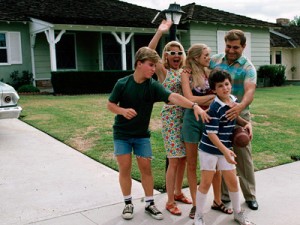I just watched the pilot for The Wonder Years on Netflix, and I thought it was fantastic, so I felt inspired to write a response to it here. This may be the only episode I write about, or I may do the entire series. You’ve been warned.
What I loved most about this pilot was the sense of melancholy and loss that permeates the entire episode. From the opening shot of grainy footage of the family innocently playing in their front yard, to the closing monologue about a long gone first kiss, The Wonder Years’ first episode is about a loss of innocence.
Of course the big plot twist is a literal loss: the death of Brian, the epitome of home-grown coolness. Kevin’s idealized version of middle school — where he wears purple pants and sits at the cool table — passes along with Brian. This plot development verifies what the opening monologue and home video footage suggests: loss of innocence will be the theme at the heart of this show.
If I have a complaint with the episode, it’s that it didn’t spend enough time establishing either Brian or Winnie, which prevented those closing minutes from having a real impact. I like the metaphor of Brian’s death, but as a character moment it felt unearned.
Winnie is a central character from the opening scenes but wasn’t given much to really define her. It’s implied by her make-over that she, like Kevin, hopes to use a new school as a chance for a new identity. But the writing never moves her beyond a piece of eye-candy for Kevin, at even in the closing moments.
Another character whose introduction felt lacking was Karen, Kevin’s older sister. Her character here seemed stereotypical and narrowly defined. I’m hopeful she’ll receive adequate development as the series evolves.
But I can’t hold any of these character quibbles against the pilot when it had so much else going on, and so much of worked phenomenally. I love that the voice-over lends significance and tension to what might otherwise seem trivial. Grown-up Kevin does just the right amount of philosophizing as he introduces us to the many characters.
I also admire that the pilot never paints strokes too broad. The details are specific, and funny, and moving. (Contrast that to the amusing, but overly broad That ’70s Show pilot.) We can see that from the opening lines alone: “1968. I was 12 years old. A lot happened that year. Denny McLain won 31 games, The Mod Squad hit the air, and I graduated from Hillcrest Elementary.” It’s charmingly specific.
It’s the details that really stand out — Paul is allergic to meat loaf and salad (he’s allergic to everything), the perfectly pathetic wrestling between Wayne and Kevin, Kevin’s narration of the tension when his dad gets home from work, the fact that Kevin had been planning his wardrobe for 6 weeks. This is pretty fantastic, entertaining writing all around.
It’s also worth noting that the pilot touches on plenty of taboo topics — Marijuana in schools, parents beating kids, birth control, and PE teachers weirdly obsessed with talking about kids’ bodies. Yet it treads these topics never in an exploitative way, but as just another fact of growing up in 1968.
As I revisit clips of the pilot, what stands out more than anything is what I mentioned first here is aching nostalgia of each scene. The feeling of a lost era is captured wonderfully in the opening sequence that I hope they re-use in future episodes of home video footage of the characters with “A Little Help From My Friends” by Joe Cocker in the background. Perfect.
If most episodes can be at least half as thoughtful and poignant as this premier, this series will be a pleasure to watch.





